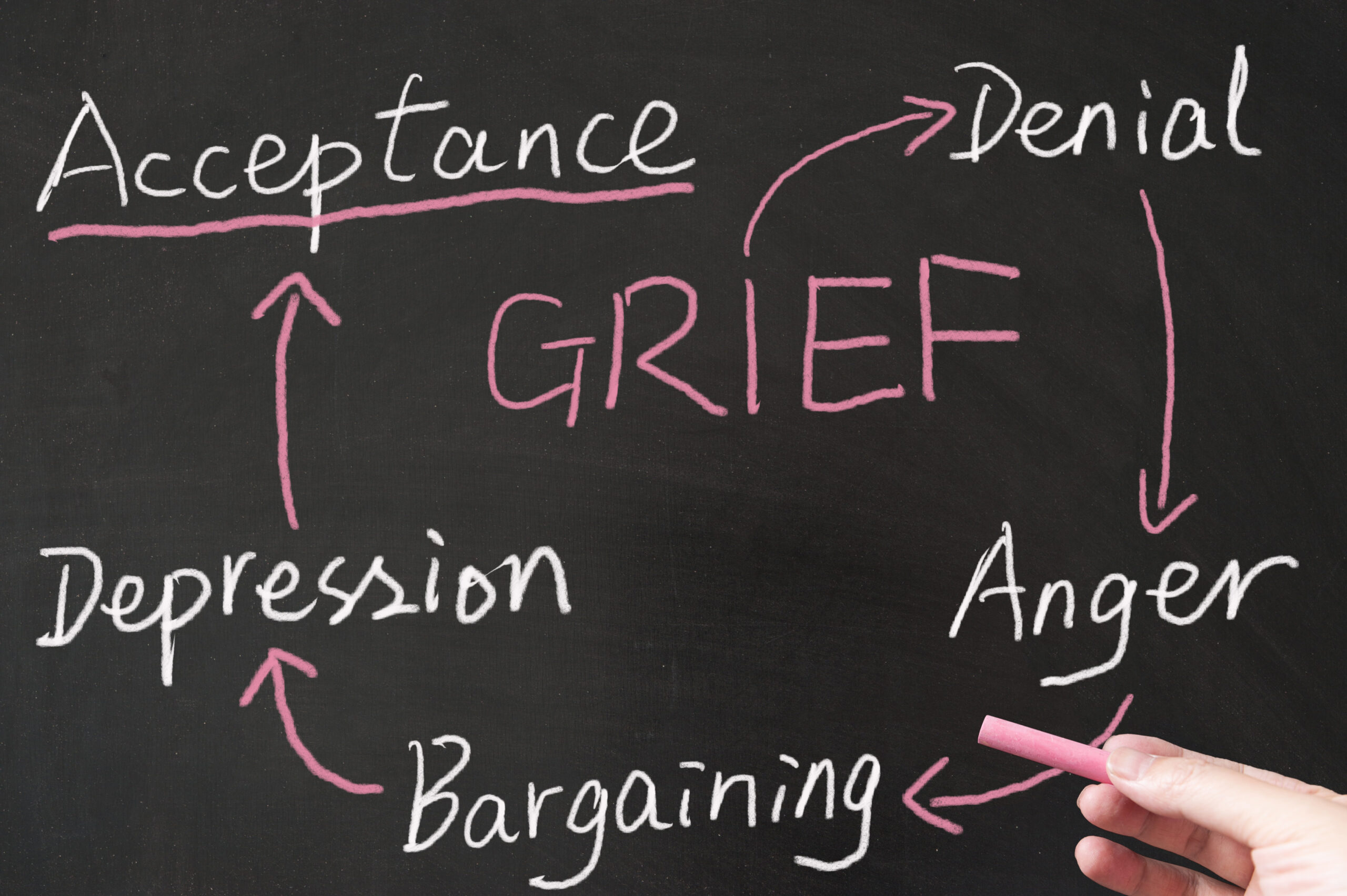Grief is a deeply personal journey that affects everyone differently. While loss can feel overwhelming, understanding the grieving process can provide reassurance and clarity. Whether mourning the passing of a loved one, the end of a relationship, or another major life change, grief is a natural response that unfolds in stages. While these stages don’t follow a strict timeline, recognizing them can help individuals process emotions and find a path toward healing.
What Are the Stages of Grief?
The five stages of grief were first introduced by psychiatrist Elisabeth Kübler-Ross in her book On Death and Dying (1969). Originally developed to describe the emotional process of terminally ill patients, these stages have since been widely recognized as a framework for understanding grief in general.
While grief is not a one-size-fits-all experience, these five stages—Denial, Anger, Bargaining, Depression, and Acceptance—offer insight into the emotions many people face. Individuals may move through these stages in different orders or revisit certain emotions multiple times. There is no “right” way to grieve, but understanding these stages can provide guidance and support.
Stage 1: Denial – “This Can’t Be Happening”
Denial is often the first response to loss, acting as a psychological buffer against overwhelming emotions. This stage allows individuals to gradually absorb the reality of the situation without feeling immediately consumed by grief.
Signs of Denial:
- Feeling emotionally numb or disconnected
- Refusing to acknowledge the loss
- Expecting the person or situation to return
- Avoiding discussions about the loss
Coping Strategies for Denial:
- Give yourself time to process the reality of the loss.
- Surround yourself with supportive loved ones.
- Keep a journal to gradually express emotions.
Stage 2: Anger – “Why Is This Happening?”
As denial fades, emotions can shift toward anger. The pain of loss may lead to frustration, resentment, or even feelings of blame directed at oneself, others, or external circumstances.
Common Expressions of Anger:
- Feeling bitter or resentful
- Lashing out at family, friends, or medical professionals
- Experiencing mood swings and irritability
- Questioning why the loss occurred
How to Manage Anger:
- Acknowledge that anger is a natural part of grief.
- Engage in physical activities like walking or yoga to release tension.
- Seek constructive outlets such as writing, art, or meditation.
- Consider speaking with a grief counselor or support group.
Stage 3: Bargaining – “If Only I Had Done Something Differently”
Bargaining involves attempting to regain control over an uncontrollable situation. This stage is often filled with “what if” thoughts, regrets, and a longing for a different outcome.
Examples of Bargaining Thoughts:
- “If only I had done more, this wouldn’t have happened.”
- “I promise to be a better person if I could just have them back.”
- “Maybe if we had chosen a different treatment, things would have been different.”
Ways to Overcome Bargaining:
- Recognize that loss is beyond personal control.
- Focus on self-compassion rather than guilt.
- Seek emotional or spiritual support through therapy or community groups.
Stage 4: Depression – “I Feel Overwhelmed by Sadness”
Depression in grief is not just sadness—it can feel like a deep, emotional weight that affects daily life. While painful, this stage is a crucial part of processing loss.
Symptoms of Depression in Grief:
- Persistent sadness and tearfulness
- Fatigue and lack of motivation
- Withdrawing from social activities
- Loss of appetite or trouble sleeping
Helpful Strategies for Coping with Grief-Induced Depression:
- Allow yourself to grieve—suppressing emotions can delay healing.
- Engage in small self-care activities, even if they feel difficult.
- Reach out to trusted friends or join a grief support group.
- Seek professional counseling if sadness becomes overwhelming.
Stage 5: Acceptance – “I Am Learning to Live with This Loss”
Acceptance does not mean “moving on” or forgetting—it means finding a way to live with loss while continuing forward. This stage is about adjusting to life in a way that honors both the loss and the person grieving.
Signs of Acceptance:
- Feeling at peace with the loss
- Finding ways to honor a loved one’s memory
- Rediscovering small moments of joy
- Developing new goals or routines
How to Embrace Acceptance:
- Celebrate the legacy of what was lost in meaningful ways.
- Explore new hobbies, volunteer work, or community connections.
- Continue seeking emotional support when needed.
- Focus on building a future while cherishing memories.
Additional Considerations in the Grieving Process
Grief does not follow a set timeline, and no two people grieve the same way. Personal resilience, cultural beliefs, and the nature of the loss all shape the grieving experience. Some individuals may experience prolonged or complicated grief, requiring additional support.
Practical Tips for Coping with Grief:
✔️ Allow yourself to feel—Bottling up emotions can prolong suffering.
✔️ Lean on your support system—Friends, family, or professionals can offer comfort.
✔️ Prioritize self-care—Healthy eating, exercise, and sleep are essential.
✔️ Seek professional help if needed—Therapists and grief counselors provide valuable guidance.
Final Thoughts
Grief is a deeply personal journey, and no two experiences are the same. While the five stages offer a general framework, they do not dictate how someone should grieve. Healing takes time, and it’s okay to seek support along the way.
If you or someone you know is struggling with grief, remember—help is available. Whether through professional counseling, community support groups, or personal self-care practices, navigating grief with support can make all the difference.
#GriefSupport #HealingAfterLoss #StagesOfGrief #CopingWithLoss #MentalHealthMatters

